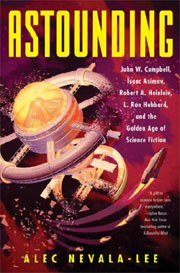 (Across the Void, by S.K. Vaughan. Skybound Books/Simon & Schuster, 2019, $27.00, 371 pp.)
(Across the Void, by S.K. Vaughan. Skybound Books/Simon & Schuster, 2019, $27.00, 371 pp.)
reviewed by Zeke Teflon
The Library Journal review of Across the Void reveals that the author is “a pseudonym for an accredited film writer and director.” This explains why Across the Void reads like an expanded screenplay, and why it serves as an excellent illustration in printed form of the contempt with which Hollywood holds science fiction fans.
Vaughn’s novel is a decently written if cliched damsel-in-distress sci-fi thriller/mystery — injured astronaut with no memory of what happened to her awakens on a crippled space ship — that’s marred by, among other things, scientific illiteracy. Two examples: 1) the crew supposedly spent a week on the surface of Europa, an intensely radioactive environment, where an hour’s exposure would be extremely dangerous and a day’s exposure would cause severe radiation sickness and death; and 2) howlers such as, “Unfortunately, the star fields 621,000 miles in all directions are unidentifiable, . . .” a statement so nonsensical that it’s not even wrong.
(Why the odd figure 621,000? The author evidently realizes that a million kilometers equals 621,000 miles, and probably thinks American readers are too dumb to know that. Never mind that “621,000 miles” makes no sense at all in regard to “star fields.”)
There’s also an unnecessary flashback to open the book, a bit of bathos (in the relationship of the astronaut and her estranged husband — who of course comes to her rescue), and some heavy-handed passages designed to reveal character and/or wow the reader, none of which helps. Nor does the author having nothing of interest to say about damn near anything.
I only read the first 50 pages or so of this one, so the remaining 300+ pages might comprise a sci-fi masterpiece. But somehow I doubt it.
* * *
Zeke Teflon is the author of Free Radicals: A Novel of Utopia and Dystopia (large pdf sample here). He’s currently if sporadically working on the sequel to Free Radicals, an unrelated sci-fi novel, and a nonfiction book on the seamier sides of Christianity (24 Reasons to Abandon Christianity, which will appear in 2020).







